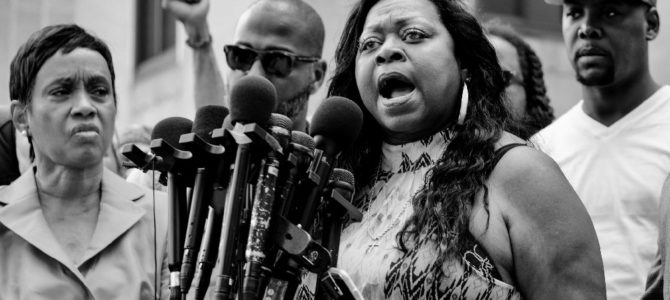
In a season when Americans celebrate our freedoms, questions surrounding the fate of one man’s life and liberties remain unresolved. A beloved son and local school cafeteria worker, 32 year-old Philando Castile was fatally shot in small-town St. Anthony, Minnesota on July 6, 2016—one year ago this week.
During a traffic stop, with Castile’s girlfriend and her daughter in the vehicle, police officer Jeronimo Yanez shot the young black man five times at point-blank range. Dash-cam video footage released on June 20 led to renewed outcry across the political spectrum including in National Review, “The Daily Show,” and The Federalist.
Following a week of deliberation that hinged on the officer’s testimony, a jury of 12 Minnesota citizens found Yanez not guilty of two criminal charges: felony manslaughter and reckless discharge of a firearm. Yanez was soon released from the police force. Ten days later, on June 26, the City of St. Anthony reached a $3 million settlement with the Castile family to resolve any civil claims.
“The death of Philando Castile is a tragedy for his family and for our community,” read the joint statement by the city and Castile family. “No amount of money could ever replace Philando… The family will continue to deal with their loss through the important work of the Philando Castile Relief Foundation.”
In such a flashpoint of racial tensions, we can learn much by listening well to wise leaders in the black community. Now, black voices from across America offer their views on this tragedy, and what we can learn as we share in the family’s grief.
When a Four Year-Old Tries to Comfort Her Mom
A speaker and writer based in Connecticut, Christina Marie Bennett believes the best lens to see this story through is the eyes of a child.
“Finding out Officer Yanez was acquitted from all charges regarding Philando Castile was tragically perplexing,” she states. “I felt genuinely confused as to how any jury could come to that verdict. Later, when I saw the video of Diamond Reynolds’ 4 year-old daughter comforting her as she was handcuffed in the police car, I was brokenhearted.”
In the viral video, the young girl assures her mom: “I can keep you safe.”
“I assumed that footage of a precious girl in pain would move even the hardest heart. I was wrong. Some people were so caught up in who was right or wrong that they couldn’t connect with the cries of a child. I don’t know what we can learn from an injustice like this, but I know how we can respond. Coming together in empathy and compassion is not an option—it’s something we must do,” Bennett implores.
“We argue about #BlackLivesMatter, #PoliceLivesMatter, and #AllLivesMatter, but beyond the social media fights lies a needed truth. We are all human and we should all be able to look at the footage of that sweet girl asking for a safer world and weep. Along with our tears of grief, we must act by works of justice to make that child’s request a reality.”
Philando Castile Shows Our Justice System is Broken
For Nicola Menzie, pursuing justice in the Castile case and others like it has become all-consuming. Her career as a religion reporter in New York City landed her stories on the Religion News Service and The Christian Post. Yet she noticed that coverage about communities of color, particularly in the Christian press, often lacked depth and authenticity.
This past January, she launched Faithfully Magazine “for people who aspire to do good, obey God, and stay woke.” Menzie and her team have written extensively on Castile’s story.
“Evangelical Christians should not entertain excuses as to why compliant, non-threatening civilians ‘deserve’ to die in encounters with inept police officers. If a jury’s refusal to hold a cop accountable for taking a man’s life and endangering an unarmed woman and child does not alarm you, then you are fast asleep,” states Menzie.“It is a travesty Philando Castile’s life was taken in such a way; a travesty his mother is expected to console herself with money; and a travesty a child is forever scarred by witnessing a cop shoot a man to death.”
She concludes: “I grieve this miscarriage of justice and pray we act to change a broken system.”
When ‘No Comment’ Says Much More
One published author, a mother of three sons, felt she could only address the situation indirectly. Requesting to remain anonymous, she sent on an excerpt of a message to her prayer partners.
“There is a risk whenever anyone speaks in less-than-glowing terms about a split-second decision a law enforcement officer makes. It’s even riskier for a person of color to do so. The truth is, I am afraid. In this day and age, actual persecution on American soil is more likely than it has been for decades for people who look like my kids and me. Surely the fear and intimidation I’m experiencing hinders the cause of Christ,” she confesses.
“Though I would never write anything harsh, because of my color I’d better be extra careful. After all, it’s no exaggeration that I could be shot, in my car, buckled in, with my kid there, totally complying with the officer’s request, with two different video clips of the encounter, no alcohol, no police record… and still the officer who shot me would be found ‘not guilty.’ This makes people like me want to shut up and stay out of it as much as humanly possible.”
“I know I should write a response,” the author concludes to her small circle of praying friends. “But this climate has made me afraid to, which comes straight from the pit of hell. Will you pray for me? Encourage me?”
We Cannot Lose Hope, Says One Black Pastor
Will Ford, an author and teacher who co-leads a church in the Dallas area, sees a big picture view of race relations. He begins, “I agree with David French, the Harvard-trained lawyer, veteran, and leading thinker who stated that the Yanez/Castile verdict was a great ‘miscarriage of justice.’ Yet we have to be careful how we handle this as pastors and leaders.”
“This tragedy can drive a bigger wedge between us,” Ford cautions. “We struggle with many questions: was Castile reaching for his gun or for his wallet? With the way the law is written, if Yanez feels he’s being threatened does he have the right to shoot? All those things come into play. But we can’t see inside that vehicle. And we can get consumed with this case in a way that’s going to bring more division.”
“One Scripture passage has become my playbook for all this,” says Ford. “It’s Second Timothy chapter two, which says in part: ‘The Lord’s bondservant must not be quarrelsome, but be kind to all, able to teach, patient when wronged, with gentleness correcting those who are in opposition…’ As a Christian, I embrace being a bondservant of God—not a bondservant of either the conservatives or the liberals. We are going to be held accountable, that we respond differently than the world.”
“Our nation has actually come farther on racial issues than we ever have before. We cannot let this one case be a defining moment that says, This is how all police are or This is how black lives will always be devalued. We have to keep the dialogue going. We have to be the ones who contend for healing,” he says with hope.
“We also contend for justice, dealing with the bigger issues—because systemically, it’s a complex situation when you look at how class and race tensions play into these incidents. My prayer is that God would use this crucible that we’re all in right now to bring us closer together, that we’d become more united rather than divided.”









